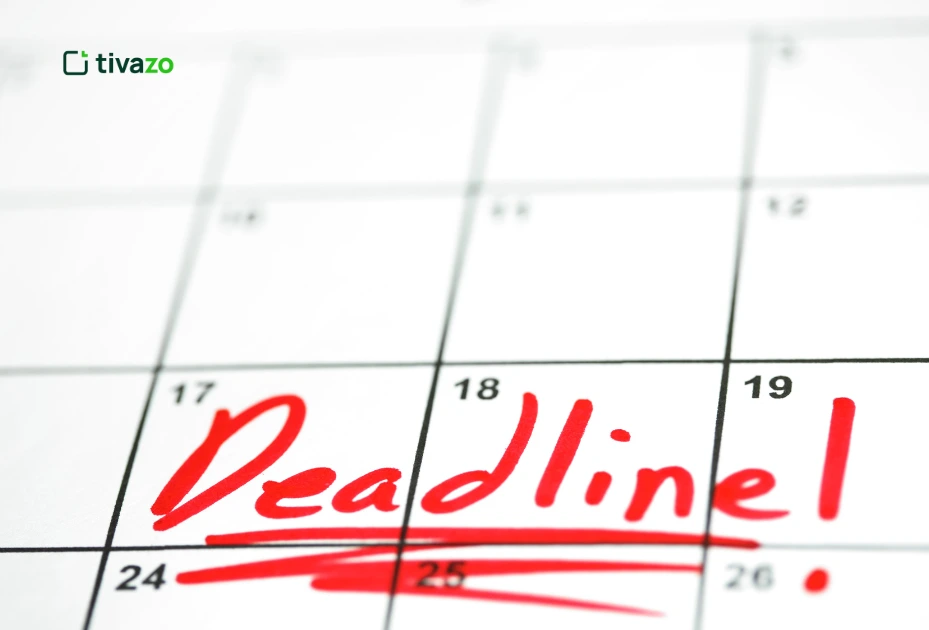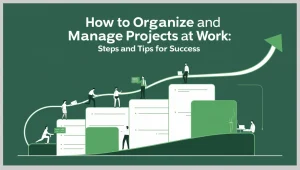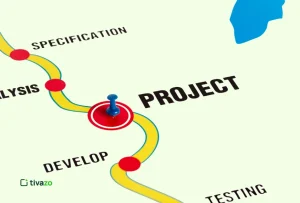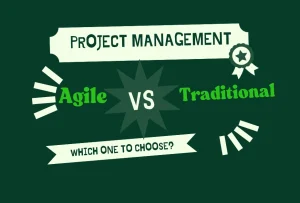How many times have you or your team members been scrambling against the clock, struggling to complete a project just minutes before the deadline? Maybe it was a case of all-nighters, cutting corners, or last-minute compromises — only to be left with burnt-out team members, subpar output, or worse, a missed deadline. These situations are more common than we’d like to admit, but they’re preventable. In fact, if there are proper systems in place, they can be eliminated altogether.
Project deadline management is far more than sticking a date on a calendar. It’s the foundation of an orderly, productive workflow and a main determinant of whether a project soars or spirals out of control. Poor deadline management routinely leads to lost opportunities, wasted resources, and damaged reputations. Effective deadline management, on the other hand, enables teams to work with clarity, direction, and confidence — while meeting objectives on time and without undue stress.
In this blog, we’ll cover 7 project deadline management hacks that will keep you and your team more organized, under less stress, and consistently delivering. Whether you’re coordinating a complex cross-functional team or your own task list, the following tips will prepare you for project and team success, one deadline at a time.
Key Takeaways:
- Why Project Deadline Management Matters
- Proven Hacks for Mastering Project Deadline Management
- Common Mistakes to Avoid in Project Deadline Management
- Final Tips for Stress-Free Deadline Mastery
- Wrapping Up: Take Control of Your Project Deadline
Why Project Deadline Management Matters

Deadlines aren’t calendar dates — they are the productivity pulse and framework upon which successful projects are founded. In the absence of enforceable and declared deadlines, even the most creative ideas can become mired, priorities get lost, and teams fall apart. That’s where project deadline management kicks in — not as a chronology chore but as an essential discipline for rendering work meaningful, timely, and productive.
Project Deadline Management is not merely a matter of assigning due dates. It is about prudent planning of resources, clear expression of expectations, and regular monitoring of progress. Properly done, it creates accountability, brings about team spirit, and ensures that all the project goals are compatible.
✅Some of the most significant reasons project deadline management has to be mastered are listed below:
1. Client Satisfaction
- Meeting deadlines instills trust and maintains professionalism.
- Reliability and consistency are admired by stakeholders and clients.
- Projects delivered on time increase the chances of repeat business and word of mouth.
2. Team Morale
Timelines that are clear eliminate stress and last-minute rushes.
Team members feel more in control and less stressed out.
Good management of project deadlines leads to a healthy working environment with workload balance.
3. Cost Efficiency
- Delays have a tendency to generate additional costs in the form of overtime, extended contracts, or lost income.
- Good deadline management helps control budgets and avoid financial shocks.
- It also limits the need for costly and time-consuming fixes or rework due to quick deliveries.
4. Quality Assurance
- Realistic deadlines and proper planning allow enough time for review, testing, and quality assurance.
- Teams are able to work methodically rather than rushing, which has a tendency to generate errors or omissions.
- With proper project deadline control, speed does not come at the expense of quality.
5. Accountability and Transparency
- Everyone knows what they have to do and by when, and responsibilities and roles are clear.
- Bottlenecks or dependencies can be identified early by teams.
- Progress can be monitored against milestones, and everyone is on the same page.
In a survey by the Project Management Institute (PMI), it was discovered that over 37% of projects fail due to poor scheduling and mismanagement of time limits. That in itself makes it brutally clear just how high the priority must be for deadline management within any operations strategy.
7 Proven Hacks for Mastering Project Deadline Management

Working successfully with deadlines is not a happenstance thing — it requires intentional strategies and daily routines. Having several stakeholders or individual projects to handle, there are certain smart hacks that can really boost how you plan and deliver. Here are 7 practical project deadline management hacks that will keep you on schedule, reduce last-minute stresses, and provide high-quality outputs repeatedly.
Hack #1: Break Down Projects into Bite-Sized Milestones
One of the best ways to learn project deadline management is to divide big goals into tiny, manageable milestones. To run a marathon is such an example. If you see only the finish line, it’s just too much, but if you concentrate on the next mile mark, it’s doable
Why it works:
- Provides more clarity and focus
- Allows better progress tracking
- Adjusts quicker
How to apply:
- Begin with a complete project outline
- Break it down into key stages
- Establish deadlines for each stage
- Allocate team members accordingly
For instance, rather than write “Launch website by July 31,” segment it into “Finalize design by July 10,” “Finalize content by July 15,” and “Test functionality by July 25.”
This easy adjustment can transform your strategy for managing project deadlines.
Hack #2: Prioritize using the Eisenhower Matrix
Not all tasks are created equal, and trying to do everything all at once is a recipe for disaster. The Eisenhower Matrix is also an excellent tool for prioritizing tasks based on urgency and importance — two vital columns in project deadline management.
How the matrix works:
- Urgent & Important: Do them first.
- Important but Not Urgent: Schedule these tasks.
- Urgent but Not Important: Delegate if possible.
- Neither: Eliminate or put off.
This approach keeps you centered on what actually matters in your project and avoids important tasks from slipping through the cracks. It’s a bare-bones framework, but it provides structure for consistent and purposeful action.
Hack #3: Use Project Management Tools Strategically
Technology has revolutionized project deadline management, but only if you use the correct software in the correct way. The largest mistake is relying on too many sites or even using tools without modifying them according to your team’s process.
Best software for deadline management:
- Trello: Trello is most suitable for visual workflow and small teams.
- Asana: Great for task assignment, dependencies, and deadlines.
- Monday.com: Flexible interface with automation features.
- ClickUp: Offers the complete suite of planning, scheduling, and goal-monitoring tools.
Best practices:
- Set start dates and due dates for every task.
- Use dashboards to look at upcoming deadlines.
- Auto-remind and auto-set status.
- Restrict communication to within the platform.
Using the tools correctly can really help your project deadline management by keeping everyone informed and on the same page.
Hack #4: Set Realistic Deadlines with Buffer Time
One of the most prevalent project deadline management traps is excessive optimism in estimating times. Sure, you’d like to impress your client or boss — but under-promising and then delivering is much preferable to the opposite.
Realistic deadline tips:
- Estimate task durations conservatively.
- Add a buffer of 10–20% on each important task.
- Include external dependencies (supplier delays, approvals, etc.).
- Leave room for unexpected issues (team sickness, technical glitches, etc.).
Let’s say a task should take five days. Instead of setting a deadline for day five, set it for day seven. This gives your team breathing room and reduces stress if anything goes off track.
Incorporating buffer time is a smart move in any project deadline management strategy.
Hack #5: Delegate Like a Pro
Project managers get themselves into the trap of micromanaging or doing everything themselves. Not only is it unsustainable, but it is also against effective project deadline management.
Why is delegation vital:
- Saves your time for macro-level planning.
- Empowers team members.
- Allows greater overall efficiency.
How to delegate:
- Delegate tasks according to skill sets.
- Determine explicitly the responsibility and expectations.
- Provide resources and assistance.
- Check in without hovering.
Remember, good project deadline management is teamwork. Trust your team while keeping them accountable in order to meet deadlines on time.
Hack #6: Conduct Regular Progress Check-Ins
You can’t manage what you don’t measure. Regular check-ins keep you up to date on progress and identify problems early before they become slipping deadlines.
Recommended check-in formats:
- Daily stand-ups: 15-minute morning meetings.
- Weekly reviews: More thorough review of project status.
- Progress dashboards: Visual updates of status (percentages, color, timelines).
Important questions to discuss at check-ins:
- What has been accomplished?
- What’s in progress?
- Are blockers or risks present?
Daily check-ins are the glue of deadline management for projects — they keep it all together and build momentum.
Hack #7: Learn from Missed Deadlines
Even with the best systems, sometimes you will miss a deadline. The idea is not to freak out or blame, but to look back, course correct, and improve.
How to learn from broken deadlines:
- Perform a post-mortem or a retro.
- Identify root causes (scope creep, vague expectations, incorrect time estimates).
- Take lessons learned and document them.
Turning failure into feedback loops is what turns average teams into high-performing teams. Flexibility is just as important as precision in project deadline management.
🚩Common Mistakes to Avoid in Project Deadline Management

Even the most effective project deadline management strategies can be derailed by some very common pitfalls that trap many teams. Being aware of and avoiding these errors is essential to staying on track and getting projects in on time. Following are some of the most common mistakes that will sabotage your deadlines — along with discussions on why they’re important and how to prevent them:
Overcommitting Resources
One of the worst traps of project deadline management is trying to do too much with too little. Overextending your team or overloading your budget to capacity can cause burnout, reduced productivity, and ultimately delay your project. Objectively assess your team’s availability and skill set before committing to deadlines. Overcommitting creates pressure that causes mistakes and a lower quality of work, so plan resources carefully.
Poor Communication
Broken communication is among the leading causes of missed deadlines. Without open and consistent communication, team members can become confused regarding requirements, deadlines, or priorities. It leads to misunderstandings, redundant work, and lost time. Successful project deadline management depends on open, frequent communication, clear expectations, and accessible channels for questioning and feedback. Encourage open communication and keep everyone on the same page as far as progress is concerned.
Ignoring Risk Management
There isn’t any project without risks — unforeseen setbacks such as delays from suppliers, technical problems, or changes in staff can all affect your schedule. Overlooking potential risks within your project deadline management plan can lead to being caught off guard when issues occur. Successful managers anticipate risks ahead of time and develop mitigation strategies. Anticipating ahead helps your team react quickly and keeps your project on schedule despite setbacks.
No Contingency Plans
Regardless of how much you plan, the unplanned can happen. Having no contingency plans as part of your project deadline management plan exposes you to disaster when Plan A fails. A contingency plan is a backup plan to keep the project going if delays or issues occur. Buffer time, backup resources, or flexible workflows as part of your contingency plan can be your savior in meeting your deadlines.
Poor Documentation
If your reliance for updates is verbal, you’re asking for trouble. If a point has not been documented, the chance is reasonable to lose or misunderstand the information. It’s important to document the project scope, deadlines, tasks, and owner, and any changes that may have occurred, because they are central to effective project deadline management. Documentation is useful to the project team as a record of their work, while also holding them accountable. If project managers and teams do not document timelines and changes, their success is hindered by potential miscommunication and missed deadlines.
If you follow these common mistakes and practices of project management and project deadline management, you may increase the likelihood of on-time, in-scope, and less stressful projects. Awareness and, more importantly, your actions are the first step in finding solutions and leading your project.
Final Tips for Stress-Free Deadline Mastery

In summary, becoming a project deadline master is not just about hitting dates — it’s about creating a sustainable workflow that makes your team sane, productive, and happy. Here are some last tips to keep you on top and reduce stress throughout your projects:
Always Review Your Deadlines Weekly
Revising deadlines on a regular basis keeps the entire project on your radar and prevents surprises. Regular check-ins allow you to reset timelines, reassign activities if needed, and identify any potential delays in the early stages. This habit maintains momentum and holds everyone accountable.
Do Not Say Yes to Unrealistic Client or Executive Demands
It’s simple to say yes to every request, but giving in to impossible deadlines places you and your team on the same path to disaster. Reinforce yourself in being polite but firm when you have to. Effective project deadline management means honest communication of what can be controlled and protects your team from burnout.
Don’t Multitask — It Kills Efficiency
Trying to accomplish too many things simultaneously most often leads to mistakes and unnecessary time loss. Focus on one at a time for better quality and faster completion. Organizing tasks based on urgency and priority keeps things clear and ensures constant progress toward your deadlines.
Make Celebrating Milestones a Part of Your Culture
After recognizing and celebrating small wins in between, it boosts morale and enthusiasm. It enables a positive atmosphere where the team feels appreciated and encouraged to tackle the next step. Celebrations confirm progress and make the process towards the deadline fun.
Train Your Team on Best Practices for Project Deadline Management
Equip your team with the abilities and skills required to manage deadlines. Educating your team on tools, time management, and communication skills creates a more proficient and independent team. The more proficient your team is at managing their own deadlines, the more efficiently your projects will flow.
By the right attitude, fixed processes, and facilitating culture, you can transform ordinary timelines into organized, worry-free workflows. Project deadline management is less about working harder — it’s more about working smarter.
Wrapping Up: Take Control of Your Project Deadlines
Mastering project deadline management is less about rigid calendars and more about flexible, forward-thinking planning. The 7 hacks we’ve defined — from task breaking down and using savvy tools to using buffer time and mastering failure — are all actionable techniques you can implement immediately.
Deadlines don’t need to create stress. Used correctly, they can be a blessing of confidence and control.
So, what hack do you want to try first? Start with one, and watch your projects run smoother, faster, and on time — all the time.
FAQs:
What is deadline management?
Deadline management is the process of organizing, tracking, and meeting exact time intervals for work and deliverables in a project. Project deadline management is making realistic timelines, assigning tasks, monitoring progress, and completing every facet of a project on time. It is an essential skill to meet goals without last-minute chaos.
How would you manage a project with a tight deadline?
Time-constrained project management requires a prioritized and strategic method. Here is how you can do it successfully:
- Prioritize based on value and urgency.
- Break up the project into manageable, concrete milestones.
- Delegate effectively and allocate work according to team strengths.
- Use project management software to streamline workflows.
- Monitor progress daily to catch delays early.
- Build buffer time, even if minimal.
Following these steps, even high-pressure projects may be managed successfully with proper project deadline management.
How to manage timelines for a project?
To manage project timelines properly, you need to:
- Clearly articulate the scope and deliverables.
- Develop a detailed project timeline with milestones.
- Use tools like Gantt charts, Kanban boards, or timeline software.
- Assign realistic deadlines for each task or phase.
- Verify and adjust timelines from time to time as the project advances.
Active communication and regular updates are key elements of successful project deadline management.
Why is it important to meet project deadlines?
Meeting deadlines on projects is vital for several reasons:
- Client satisfaction: Punctual delivery creates confidence and trust.
- Budget control: Avoids costly delays and overrun expenditures.
- Team efficiency: Upholds high morale and prevents burnout.
- Reputation: Meeting deadlines consistently reinforces your professional reliability.
Effective management of project schedules ensures that resources are being used properly, that the stakeholders are informed, and that goals are achieved with minimal worry or eleventh-hour rushes.




